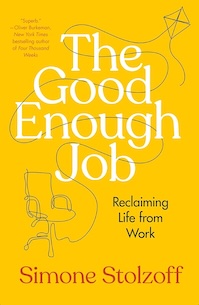
“The Good Enough Job” by Simone Stolzoff is a critique of today’s work culture, where work is the central source of identity, purpose and fulfillment. He encourages readers to diversify their sources of meaning and fulfillment, by investing in relationships, hobbies, and activities outside of work.
Here are some of my highlights from the book:
- Jobs have become akin to a religious identity: in addition to a paycheck, they provide meaning, community, and a sense of purpose.
- The notion that we should always love our job creates outsized expectations for what a job can deliver.
- In order to build a more resilient sense of self, actively invest in your nonwork identities. Finding meaning from multiple parts of your life means that when a setback comes in one aspect, it doesn’t sting as much.
- Play is a natural antidote to workism. It indexes not on utility, but on curiosity and wonder. In art, there’s crafting. In music, there’s jamming.
- Employees with friends at work report higher levels of productivity, retention, and job satisfaction.
- Brain scans show that idle time and daydreaming create alpha waves that fuel creative insights and innovative breakthroughs.
- We seek status because we don’t know our own preferences. When we don’t trust our own definition of what is good, we let other people define it for us.
- If our self-worth is tied solely to external rewards, we can spend our whole lives chasing carrots without ever feeling full.
- Kurt Vonnegut and Joseph Heller were once at a holiday party thrown by a billionaire hedge fund manager when Vonnegut asked Heller a question: “Joe, how does it make you feel to know that our host only yesterday may have made more money than your novel ‘Catch-22’ has earned in its entire history?” “Well,” Heller responded, “I’ve got something he can never have.” “What on earth could that be, Joe?” Vonnegut asked. “The knowledge that I’ve got enough.”
His interview with Paul Millerd was also fun to listen to:
